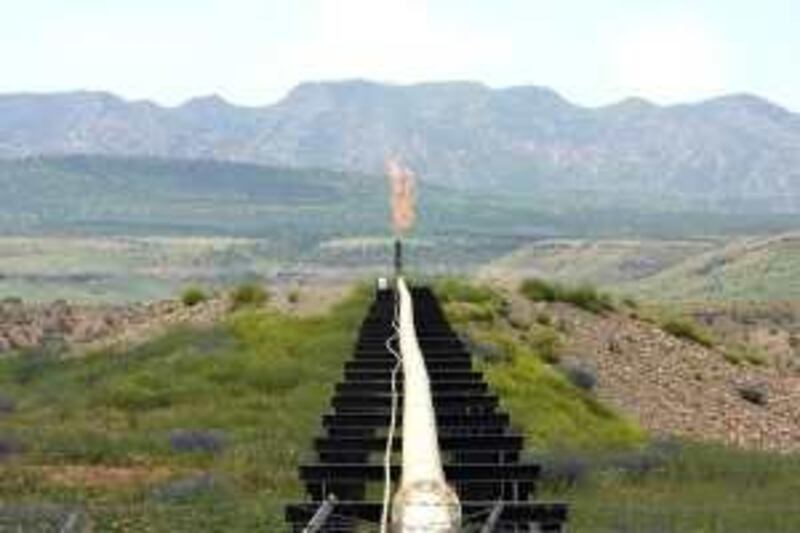When US troops stormed into Iraq in 2003, expecting to be welcomed as liberators, they all too soon learnt the pitfalls of operating in one of the most politically fractious countries in the Middle East. A similar fate could await international oil companies that are preparing to return to Iraq under long-term contracts to be awarded at the end of this month. The 20-year deals to boost production from six of Iraq's biggest oilfields and two gasfields offer access to 43 billion barrels of recoverable crude, or more than a third of the oil-rich country's 115 billion barrels of total proved reserves, as well as 5.4 trillion cubic feet of gas.
"The size of reserves on offer is larger than anything else in the world," said Alex Munton, an analyst at the British consulting firm Wood Mackenzie. "For that reason alone, all the big oil companies will have an interest in bidding on these projects." But the risks are enormous, with an 11th-hour revolt against the bidding round by the technocrats running Iraq's biggest state-owned oil company indicating the problems the winners could face as they attempt to forge working relationships with reluctant Iraqi partners.
South Oil Company (SOC), which pumps most of Iraq's 2.45 million barrels per day (bpd) of crude output, said last week it objected to the proposed deals because they covered producing fields in which Iraq had invested US$8 billion (Dh29.36bn) since the US-led invasion. Fayad al Nema, the newly appointed director general of the company, said long-term contracts allowing foreign companies to reap the benefits of Iraqi investment were not in the country's best interest. Yesterday, he told Reuters the contracts could land the winners of the bids in a legal quagmire for years.
Dr Hussain al Shahristani, the Iraqi oil minister, has been summoned before parliament on Tuesday to answer questions about the bidding round. Previously, 140 parliamentarians signed a petition calling for the minister to face questioning on his energy policies, which have so far failed to stem production declines at Iraq's largest oilfields. And the regional government of semi-autonomous Iraqi Kurdistan, which has long been at loggerheads with Baghdad over oil jurisdiction and territory, said any firm winning contracts for work on oilfields around the disputed city of Kirkuk would need Kurdish support to operate.
The current competitive licensing round replaces a scrapped scheme to award short-term technical service contracts to hand-picked companies for the emergency refurbishment of oilfields suffering from chronic underinvestment and poor reservoir management. It is the cornerstone of Dr al Shahristani's plan to boost Iraq's oil production to 6 million bpd within five years, boosting revenue the country badly needs to rebuild its shattered infrastructure after decades of war and misrule.
But if the minister does not survive the multi-pronged assault on his authority, or if he is replaced in six months' time in a regime change following Iraqi national elections, then any contracts the ministry signs with foreign oil companies would be in jeopardy. That is because power struggles between the ministry and parliament, and between the central government and the Kurds, have left a draft federal oil law for Iraq in limbo, as the conflicting parliamentary factions have stalled its passage.
"We need to stabilise the political environment in Iraq. We need to improve the legal framework and to make compromises over new laws," Sabah al Shammery, the chairman of Iraq's Sapco Group, said last week in Dubai, in an investment pitch to oil producers and service companies represented by the British Business Group. SOC's revolt is the latest manifestation of mounting opposition to the bidding round, but it has been festering for some time. Jabbar al Luaibi, who is Mr al Nema's predecessor and now an oil ministry adviser, has criticised Dr al Shahristani and his staff for taking too long to make decisions on projects that could have prevented the loss of hundreds of thousands of barrels per day of production from Iraq's big southern oilfields.
"This is not the way to run an oil industry," Mr al Luaibi told the web-based news service Iraq Oil Forum last month. "What we need is someone who is able to take decisions fast." Yesterday, Nouri al Maliki, the Iraqi prime minister, called the withdrawal of US combat troops from cities "a great victory for Iraqis", and a start towards "ending the foreign presence in Iraq". He also told Iraqis not to lose heart if the country's security situation worsened.
Under a security deal signed between Baghdad and Washington last year, US combat forces must leave urban centres by June 30, a date that corresponds closely with the scheduled oil contract announcements on June 29 and 30. @Email:tcarlisle@thenational.ae





